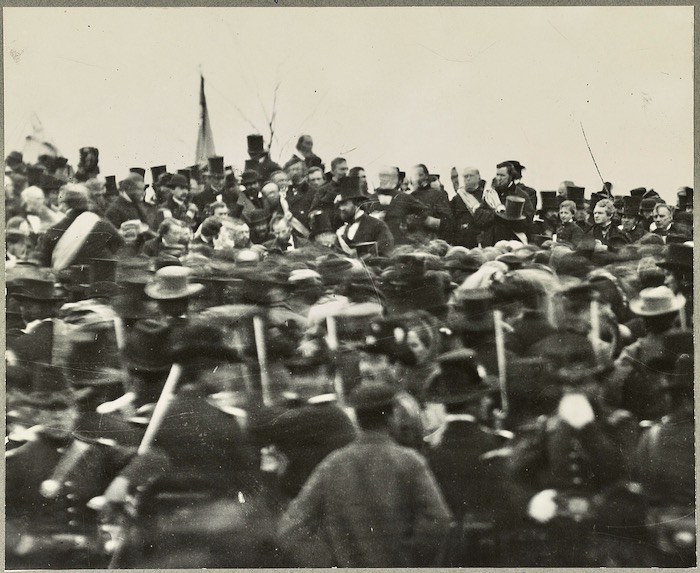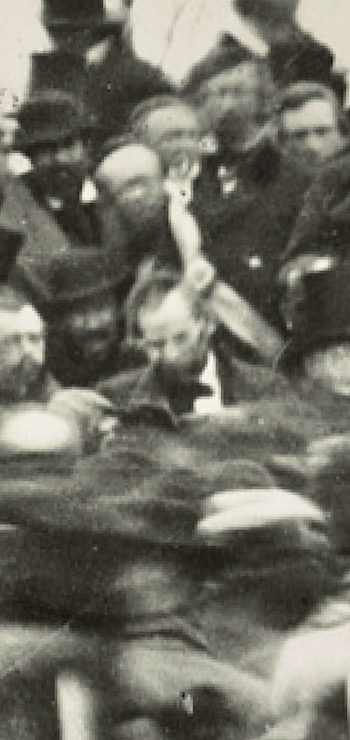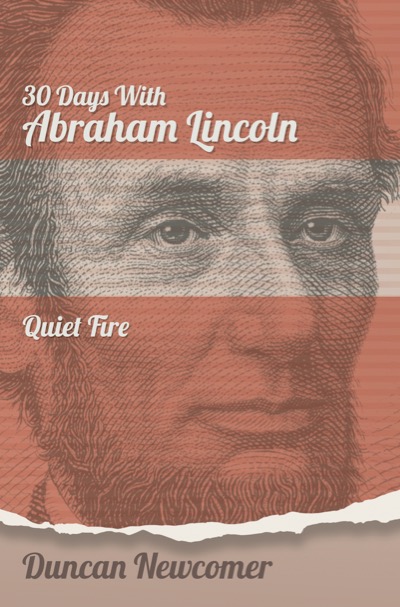
WHAT A POWERFUL PHOTO! This is one of only 2 confirmed images of Lincoln on the day he delivered his Gettysburg Address in 1863. The power of the photo certainly doesn’t lie in its visual clarity of Lincoln himself—it lies in the visual truth of the overwhelming forces surrounding Lincoln at this time. This photo was taken just as Lincoln was arriving, hours before he would deliver his address. He appears here without his trademark stovepipe hat, bareheaded and looking downward, right in the middle of this vast sea of people who are almost submerging him in the press of bodies.
.
EDITOR’s NOTE—In honor of Memorial Day, which began after the Civil War, we are including a chapter from Duncan’s book of collected radio commentaries, 30 Days with Abraham Lincoln, which recalls Lincoln at Gettysburg in 1863. On that battlefield, Lincoln forever changed our understanding of what that tragic conflict represents in our history.
And, here is Duncan …
.
By DUNCAN NEWCOMER
Host of the ‘Quiet Fire’ series
This is Quiet Fire, a meditation on the spiritual life of Abraham Lincoln and its relevance to us today. Welcome.
Here’s a Lincoln quote for you that most of us know by heart: “Four score and seven years ago …” The quote is, of course, the memorable opening to Lincoln’s Gettysburg Address, which he delivered on November 19th, 1863.

CLOSEUP of Lincoln (center) from the larger photograph.
Note that he says “four score and seven,” rather than “87 years ago.” In understanding the spiritual life of Lincoln, there is a reason why he chooses to start with the number 87 and there is a reason why he chooses the archaic “four score and seven.”
Often, Lincoln thinks and speaks more like a spiritual poet than a rational politician. At Gettysburg, Lincoln was attempting to invoke the “Spirit of ’76,” when the banner-raising Declaration of Independence was signed by people with the commitment to risk their lives, fortunes and sacred honor.
As Lincoln saw it, 1776 was when the blood of the American Revolution began to flow—and the idea of America was conceived. For him, the nearly mystical idea of a freed and equal people governing themselves was the real origin of America. Those powerful ideas were, Lincoln believed, even more important than the Constitution, which came a decade later.
As Lincoln looked back, he believed that the conception of America—while not exactly an immaculate conception—was much more of a holy idea than a law book. And it is conception and birth that are the metaphors and verbs he used in this speech.
We have two really different frames of mind here: the fever and blood of an ideal versus the debate and ink of a document.
So, Lincoln used biblical language—not arithmetic—to name the value of the moment. “Four score and seven years ago” is how Lincoln, who had memorized much of the Bible, echoes the language of Psalm 90’s meditation on the life span of a human being, especially in relation to the eternity of God:
The days of our years are threescore and ten;
And, if by reason of strength, they be fourscore years,
Yet is their strength labor and sorrow;
For it is soon cut off, and we fly away.
In other words, human life is short—perhaps only 70 years. Even if we do reach 80 years, labor and sorrow will use up our strength. Lincoln did not get to 80 or 70, and nearly all of his labor was in sorrow.
Lincoln could not help himself in casting his comments in biblical tones, because for him, the vocabulary of the holy is what was called for when a battlefield (and all it represented) was being dedicated to the sacrifice of young American warriors. Secularizing forces in our modern Western world have drained our religious traditions of many of their riches, encouraging us to prize material success over spiritual depth. Lincoln was never fooled by that temptation.
As a spiritual poet, Lincoln stood at the cusp of this looming secularization. He was born at the height of what we call, today, “that old-time religion,” and his mind was formed in the thought patterns of the Bible first and then the law. So, as he pulled out his little slip of paper and began his address at the battlefield, it was natural for him to reach, first, for the Bible. He looks to the past because that is where biblical authors look as they survey the history of God’s people. Lincoln’s restless mind was always trying to understand his moment within the grand sweep of history.
At Gettysburg, he does not gain his inspiration from the crowds around him; he does not look to the stars and the trees and the beauties of nature. He looks to history.
Why is looking to history a spiritual thing to do? History is bigger than we are. History is a driving force, pushing us from behind into a “now” that is colliding with the future. Lincoln’s favorite line from Shakespeare was:
“There’s a divinity that shapes our ends
Rough hew them how we will.”
All of Lincoln’s thoughts, words and actions flow from his humility: his sense that he is small and history and God are vast. The sweep of the eternal infinite is the mindset and the vocabulary of a spiritual person.
Lincoln believed that we cannot escape history, but we can take up our responsibility and find, if not our significance, then our honor—even down to the latest generation.
.
.
Stay Tuned!
We will let you know when Duncan is able to begin recording the radio versions of these weekly reflections again—and we will provide links to that audio as well as these texts.
Coming next week: We will take an imaginative journey. Like John Bunyan’s Pilgrim’s Progress (one of Lincoln’s early and favorite books), we will see Lincoln encounter two spiritual heroes on his progression. One is Joan of Arc, who becomes Saint Joan, and the other is John Chapman, who becomes Johnny Appleseed.
.
Care to Enjoy More Lincoln Right Now?
GET A COPY of Duncan’s 30 Days with Abraham Lincoln—Quiet Fire.
Each of the 30 stories in this book includes a link to listen to the original radio broadcasts. The book is available from Amazon in hardcover, paperback and Kindle versions. ALSO, you can order hardcover and paperback from Barnes & Noble. In addition, our own publishing house offers these bookstore links to order hardcovers as well as paperbacks directly from our supplier.
.
- Duncan Newcomer’s Abraham Lincoln Quiet Fire 4: The courage to say—’In spite of all this, I will be!’
- Duncan Newcomer’s Abraham Lincoln Quiet Fire 1: In this cruel month of death, what will be our legacy?
- Duncan Newcomer’s Abraham Lincoln Quiet Fire 2: Coping with the Uncertainty and Mystery of a Deadly Disease
- Duncan Newcomer’s Abraham Lincoln Quiet Fire 3: We Must Rise with the Occasion
- Duncan Newcomer’s Abraham Lincoln: When will we be good? God knows!
- Duncan Newcomer’s Abraham Lincoln Quiet Fire 6: Lincoln’s Courage to Judge and to Lament
- Duncan Newcomer’s Abraham Lincoln Quiet Fire 7: Lincoln looks toward his spiritual hero, Washington
- Duncan Newcomer’s Abraham Lincoln Quiet Fire 8: Four Score and Seven
- Duncan Newcomer’s Abraham Lincoln Quiet Fire 9: A Unique Spiritual Quest and The Pilgrim’s Progress
- Duncan Newcomer’s Abraham Lincoln Quiet Fire 10—When all three meet: Lincoln, black people and the Bible.
- Duncan Newcomer’s Abraham Lincoln Quiet Fire 11—Raising a Flag and Contemplating the Sacred Pillars of America
- Duncan Newcomer’s Abraham Lincoln Quiet Fire 12—Why do we refer to our most eloquent president as ‘Quiet’?
- Duncan Newcomer’s Abraham Lincoln Quiet Fire 13—Ultimately, we are responsible for our faces.
- In Our Struggle for Freedom, the Truth is Not in Our Statues—It’s in Our Souls
- Duncan Newcomer’s Abraham Lincoln Quiet Fire 16—In racial justice, ‘We … bear the responsibility.’
- Duncan Newcomer’s Abraham Lincoln Quiet Fire 17—Remembering Mrs. Keckley, a close friend who Lincoln realized he did not truly know
- Duncan Newcomer’s Abraham Lincoln: Remember when a president’s 1st value was Kindness?
- Abraham Lincoln Quiet Fire 19—’The election was a necessity’
- Duncan Newcomer’s Abraham Lincoln Quiet Fire 20—’A Most Sacred Right’
- Duncan Newcomer’s Abraham Lincoln Quiet Fire 21—Locating the spiritual X-factor in Lincoln’s ground-breaking life
- Duncan Newcomer’s Abraham Lincoln Quiet Fire 22—Lincoln shows us the power of holding even opposites together
- Duncan Newcomer’s Abraham Lincoln Quiet Fire 23—The forest vision Lincoln shared with poet Rabindranath Tagore
- Duncan Newcomer’s Abraham Lincoln Quiet Fire 24—Myths and wisdom in national conversation about rule of law
- Duncan Newcomer’s Abraham Lincoln Quiet Fire 25—How a true leader expresses the nation’s grief
- Duncan Newcomer’s Abraham Lincoln Quiet Fire 26—Choosing Humility over Humiliation
- Duncan Newcomer’s Abraham Lincoln Quiet Fire 27—What shaped Lincoln’s soul?
- Duncan Newcomer’s Abraham Lincoln Quiet Fire—Here’s to you Mrs. Robinson!
- Duncan Newcomer’s Abraham Lincoln Quiet Fire—Now, we’re all hoping for ‘Yonder’
- Duncan Newcomer’s Abraham Lincoln Quiet Fire—In three words, he said it: ‘We are elected.’
- Duncan Newcomer’s Abraham Lincoln Quiet Fire—Let’s remember how he reached across the aisle to discover new friends
- Duncan Newcomer’s Abraham Lincoln Quiet Fire—Marking the anniversary of those 272 words at Gettysburg
- Duncan Newcomer’s Abraham Lincoln Quiet Fire—’The Last Best Hope of Earth’
- Duncan Newcomer’s Abraham Lincoln Quiet Fire—’A Christmas Carol’ with Abraham Lincoln

